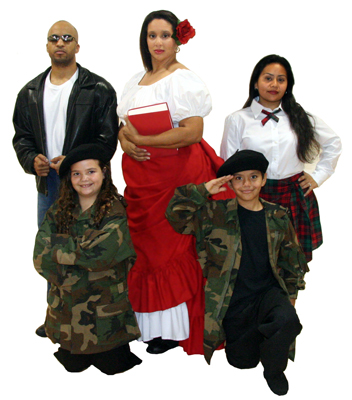
Enjoy this article on Celestina Cordero, a woman -- a hero -- ahead of her time (Spanish below, English translation follows.) Her story inspired the creation of Puerto Rican Folkloric Dance's newest bilingual musical -- Pa' Mi Gente -- written by PRFDance Director Ana Maria Tekina-eiru' Maynard in collaboration with Rupert Reyes (Director, Teatro Vivo) and Zulmarie Alverio (Researcher, Puerto Rico). Don't miss our musical and this important story in Puerto Rican history -- done in PRFDance's traditional, lively style!
Celestina vivió entre los siglos 18 y 19. Su vida estuvo marcada por las dificultades que suponía ser mujer y negra en una sociedad puertorriqueña como la de entonces. Sin embargo, ni su género ni su color evitaron que difuminara la semilla del conocimiento. Ella supo desde el inicio que la gente le diría que no, que le cerrarían puertas y la mirarían como desigual. Sin embargo, no se amilanó. No permitió que el temor o la frustración llenaran su corazón.
Aún cuando el Estado no promovía la educación formal de las mujeres, Celestina decidió abrir las puertas de su hogar y desde allí educar. La educación como proyecto de vida surgió en ella desde muy niña, pues gracias a sus padres, Lucas Cordero y Rita Molina, aprendió a leer y escribir en una época en la que las niñas no tenían acceso a la instrucción. Así fue que desde su cuna se convirtió en una excepción. Por eso entendía, desde la sabiduría que nos ofrece la experiencia, que la educación era necesaria.
Como la mujer irreductible que fue, luchó desde los foros públicos para que se le nombrara en propiedad como maestra. Más tarde el Estado le otorgó el título en propiedad de maestra y además oficializó (1820) su Escuela de Niñas en San Juan. En el momento de la oficialización de la Escuela, Celestina contaba con 116 discípulas. La valentía y el compromiso de esta ilustre mujer fueron comprobados por sus contemporáneos. A pesar de ello, las generaciones posteriores sólo conocen a su hermano Rafael Cordero Molina, “El Maestro”.
Algunos se preguntarán por qué se le ha negado la visibilidad y reconocimiento que Celestina merece. Muchas pueden ser las teorías erigidas entorno a esta discusión, pero lo fundamental es difundir y emular su proyecto: educar sin importar el género, la raza o la condición social.
The Puerto Rican Folkloric Dance & Cultural Center presenta la rica historia y tradicion de Puerto Rico en una musical teatral bilingue llamado Sembrando Herencias del 2009 –“Pa Mi Gente” el Domingo 13 de Diciembre empezando a las 3:00 de la tarde en el Davis Auditorium, Texas School For the Deaf, 1102 S. Congress in Austin Texas, 78704. Entrada para Adultos $10.advance, en la puerta $12. Los ninos desde los 12 anos $5, los menores de 2 anos la entrada es gratis. Para comprar boletos visite, http://casita.prfdance.org/sembrando2009. Para mas informacion visitenos al http://www.prfdance.org.
¡Qué Viva Celestina!
(Datos extraídos de la tesis de Zulmarie Alverio Ramos, “En búsqueda de la maestra Celestina Cordero Molina dentro de la memoria social de Puerto Rico”, University of Puerto Rico, Rio Piedras, 2005.)
Celestina lived between the 18th and 19th centuries. Her life was marked by the difficulties that being female and black in a Puerto Rican society represented in those times. Nevertheless, neither gender nor race were an obstacle in her quest to broadcast the seed of knowledge. She knew from the beginning that people would tell her no, that they would close their doors and they would look down upon her.
In spite of this, Celestina never backed down. She never allowed fear or frustration to get a hold of her heart. Even in a time when the State did not promote formal education for women, Celestina decided to open the doors of her home and teach from there. Education as a life-project was within her from childhood since, thanks to her parents, Lucas Cordero y Rita Molina, she learned how to read and write in a time in which girls where not granted access to formal instruction. In this way, she was an exception from the cradle. Maybe because of this, she understood, fueled by the knowledge that comes from experience, that education was necessary.
Celestina fought irreducibly for her right to become a certified teacher in public forums. The State finally granted her the official title of teacher in 1820, same year in which her School for Girls in San Juan became officially recognized. At the moment when the School became officially recognized, Celestina had 116 disciples. The courage and compromise of this illustrious woman where witnessed by her contemporaries. Notwithstanding, subsequent generations know only her brother, Rafael Cordero Molina, “The Teacher”.
Many will ask themselves why she has been denied the visibility and recognition she deserves. Many theories can be built around this discussion, but what truly matters is to disseminate and emulate her project: to educated regardless of gender, race or social standing.
The Puerto Rican Folkloric Dance & Cultural Center presents the rich history and traditions of Puerto Rico in a new bilingual musical, Sembrando Herencia 2009 - Pa' Mi Gente, Sunday, December 13, 3pm. Davis Auditorium, Texas School For the Deaf, 1102 S. Congress in Austin Texas, 78704. Adults $10 Advance/$12 Door, $5 Children 12 & under, FREE Children 2 & under. For tickets visit http://casita.prfdance.org/sembrando2009. For more information on Puerto Rican Folkloric Dance visit http://prfdance.org.
¡Que viva Celestina!
(Information extracted from the thesis of Zulmarie Alverio Ramos, “En búsqueda de la maestra Celestina Cordero Molina dentro de la memoria social de Puerto Rico”, University of Puerto Rico, Rio Piedras, 2005.)